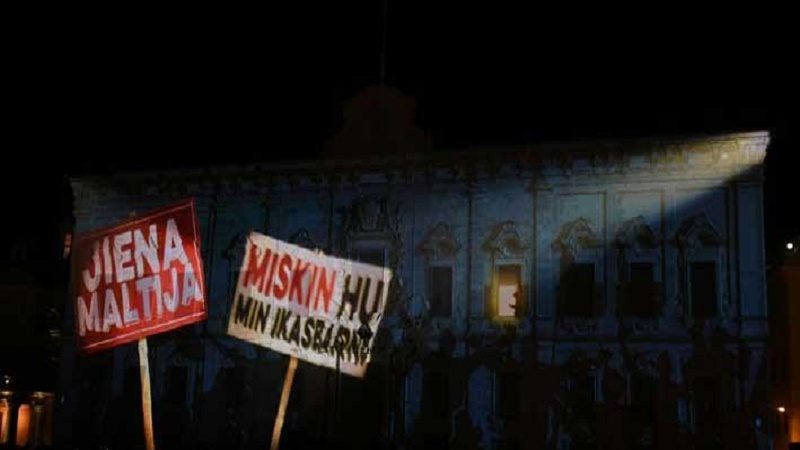Basking in the aftermath of a spectacular, well choreographed albeit bombastic V18 launch, Prime Minister Joseph Muscat triumphantly claimed that national pride has reached historic levels, adding that a “strong sense of pride has returned today, where we believe in our abilities, and that we can be as good as others, if not better.”
Nothing extraordinary in him saying this. Probably Lawrence Gonzi would have said something similar had he presided over V18. Muscat’s talk of a confident Malta is also reminiscent of Tony Blair’s cool Britannia.
Yet the context where this sense of pride is being evoked is one of increased consolidation of power in Castille in the face of mounting international criticism and scrutiny on his trackrecord on governance.
Muscat’s skilfully evokes ‘national pride’ without sounding divisive. As often happens, the task of calling out the traitors is left to the squealers who occupy the lower ranks in Labour’s pecking order.
But this comes with an opportunity for opposition forces because ‘national pride’ can be used to hit back at Muscat. What is so patriotic in selling national assets to fake investors and passports to millionaires while ruining the Maltese landscape as Malta is turned into a playground for the global rich?
Muscat’s patriotism is based on growth on steroids, consumerism and a mercantilist approach to geopolitics.
This was evoked in dystopian V18 images of Malta as a high rise conglomeration but it resonates because various segments of society are benefiting from economic growth.
Widening the circle of beneficiaries of dubious policies and decisions is one major factor which distinguishes Muscat from previous PN-led governments. In this way, Muscat has also increased the number of those who have a stake in maintaining the status quo.
Muscat can never be underestimated in his ability to both shape and capture the mood of Maltese society.
One may be tempted to argue that faced with scandals of the scale of Vitals, the AUM failure and the legacy of Panamagate, the government should be reeling at the sight of street protests rather than basking in the aftermath of a cultural event which attracted thousands to Valletta to celebrate.
In reality it is Muscat who benefits from the evocation of such a contrast. One can be adamantly against Muscat’s track record on governance and still enjoy the show and feel good about Valletta being the cultural capital of Europe. Shunning people for having fun is a major no-go in the art of political persuasion. This is why Adrian Delia did well in attending the V18 celebrations.
Muscat also understands that the country is tired of political confrontation. While some, including PN voters, are busy making hay while the sun shines many carry on with their normal lives, having disengaged from politics altogether. The anger of the few is legitimate but risks being drowned in the clutter of everyday life.
That is why the only way for the opposition to beat Muscat is by understanding Maltese society as well as he does.
The picture emerging of Maltese society from various surveys is one where the dominant concerns are related to crime, traffic, the environment and the influx of foreigners. This may well make Malta fertile for right wing politics. If the opposition goes down that path it risks leaving the middle ground to Muscat.
But it also shows a growing concern about quality of life, which can well propel an alternative based on a different kind of love for the country, a love for its landscapes, communities, feasts and diversity which make it unique. A soft inclusive patriotism which defends the common good from the greed of the few may be the antidote to Muscat’s brand of amoral nationalism.
What the opposition needs to win over are actually Labour voters, former Nationalists who turned Labour and a mass of voters who switch off between elections. Shunning these voters is another no-go in the battle for winning hearts and minds.
Muscat may have won over a number of PN voters but a segment of Labour voters still do feel uncomfortable with Muscat’s brand of neo-liberalism. Most of these love their party and will never vote against it. But civil society is in an ideal place to reach out to them especially with regards to environmental issues where change can happen in the here and now.
While Muscat’s strategy is effective, the opposition should be wary of emulating him. Embracing regressive environmental policies or property and land deals to win back businesses who embraced Labour may expose the PN to even more damage. Muscat also banks on the opposition becoming paralysed through its internal contradictions.
Understanding the national mood and why Muscat has been so successful may ultimately by the key in weakening his hold on Maltese society. National pride may prove to be Muscat’s Achilles heel, if this sentiment is articulated in a way which appeals to the present day concerns of the Maltese people.












